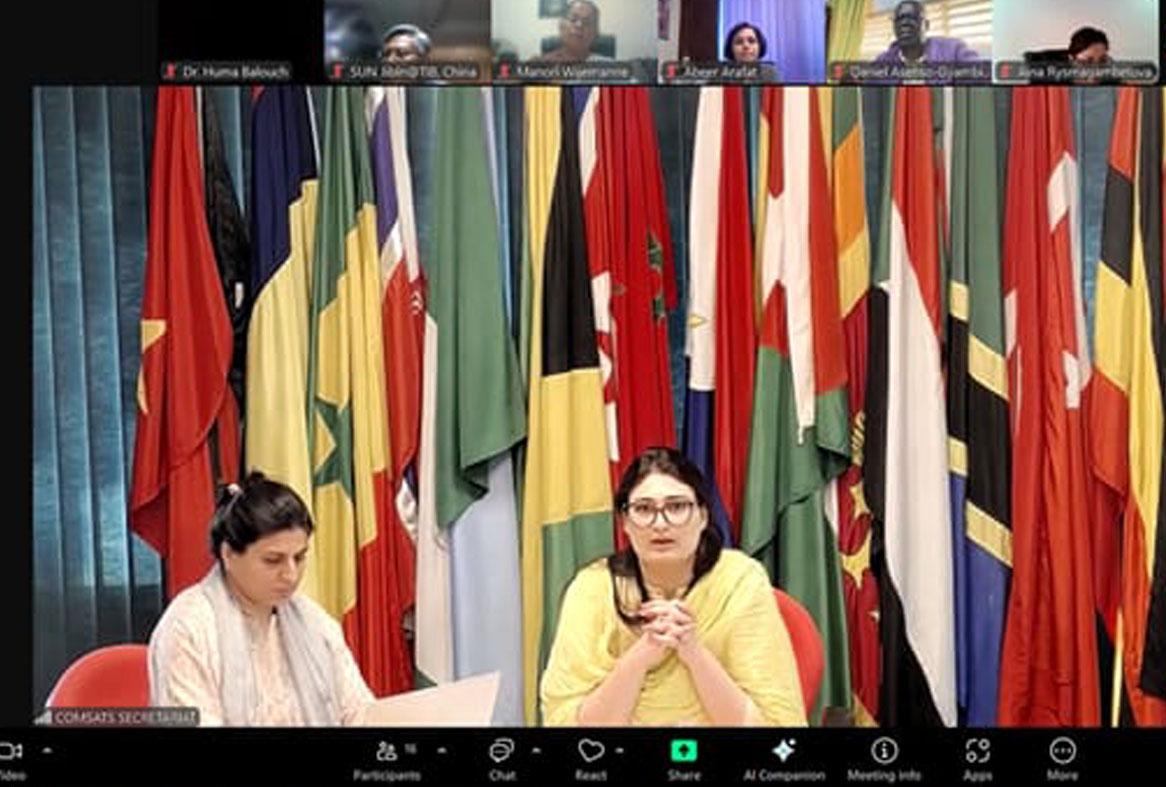Islamabad, 20th June 2025. In observance of World Environment Day 2025, the Commission on Science and Technology for Sustainable Development in the South (COMSATS), in strategic collaboration with the Ministry of Climate Change and Environmental Coordination (MoCC&EC), National Disaster Management Authority (NDMA), the United Nations Environment Programme – NAP Pakistan, ECO Science Foundation (ECOSF), National Disaster Risk Management Fund (NDRMF), International Center for Agricultural Research in the Dry Areas (ICARDA), Welthungerhilfe (WHH), and the Food Security and Agriculture Center of Excellence (FACE), convened a high-level national seminar under the thematic focus “Bridging the Climate-Adaptation Divide Across the Food-Water-Agriculture Nexus.”
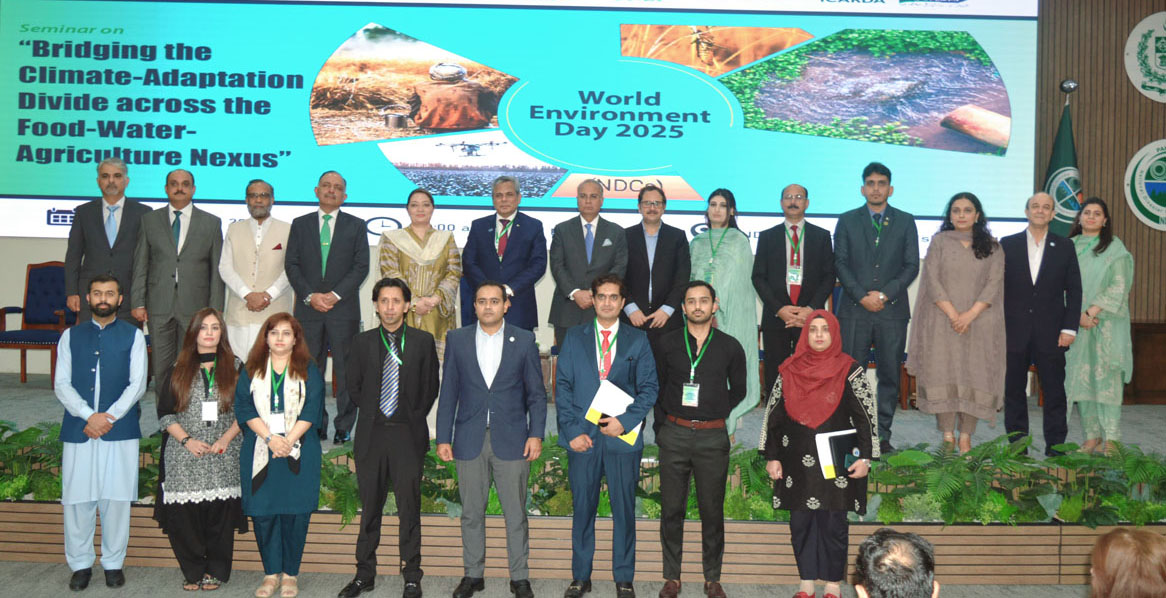
Hosted at the NDMA Auditorium in Islamabad, the event served as a timely forum for galvanizing multisectoral dialogue on the disproportionate climate vulnerabilities faced by agrarian economies, with particular emphasis on adaptation asymmetries in the Global South.
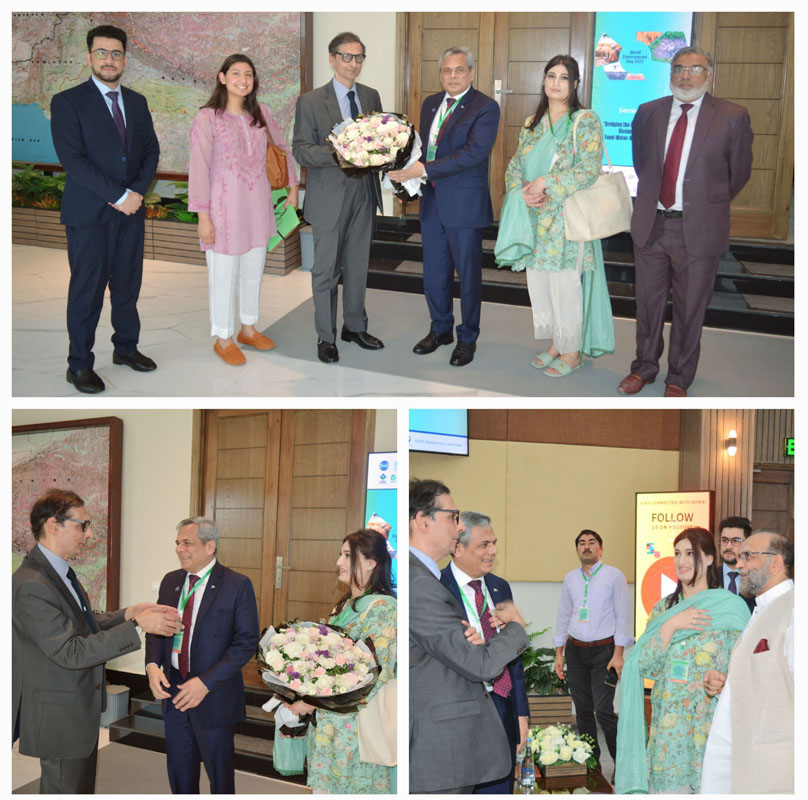
The seminar brought together a distinguished gathering of over 200 high-profile participants, including senior officials from federal ministries, climate scientists, development practitioners, multilateral partners, and representatives from academia, civil society, and the private sector. Notably, Ambassadors and deputy Heads of Mission from Malaysia, Kazakhstan, Ethiopia, Sri Lanka, Yemen, Turkmenistan, Sudan, Somalia, Syria, Tunisia, and Azerbaijan attended, reflecting strong diplomatic engagement and international support for climate action. Deliberations focused on identifying actionable pathways to address the complex interlinkages between climate change, agriculture, food insecurity, and water governance, with particular emphasis on adaptation financing, technology dissemination, and regulatory coherence.
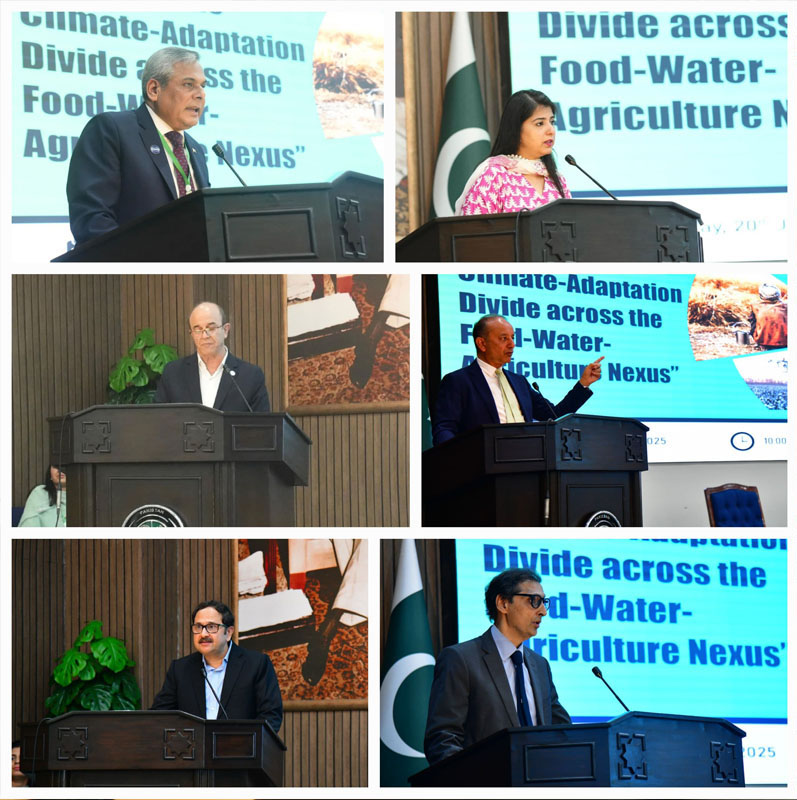
Federal Minister for Climate Change and Environmental Coordination, Dr. Musadik Masood Malik, who graced the occasion as Chief Guest, delivered a compelling and intellectually charged address, sharing candid views on the very concept of climate action strategy, climate financing, and self-strength to tackle climate challenges. He also reflected on Pakistan’s approach in curbing carbon emissions and the gaps in climate governance involving multiple stakeholders. He articulated the stark paradox of water accessibility—where abundance coexists with the urgent need for professional management—while expressing concern over the widespread wastage of resources and the lack of access to safe drinking water for the common man. Dr. Malik underscored the strategic yet underexploited role of wetlands as nature-based solutions for carbon sequestration, advocating for a paradigm shift toward ecological stewardship. He called for decisive action over continued dialogue and emphasized focus on global innovation metrics and scientific publication indices. Notwithstanding these multifaceted challenges, he reaffirmed the Government’s commitment to embedding adaptive capacity within national development frameworks and aligning Pakistan’s climate aspirations with the imperatives of global sustainability regimes.
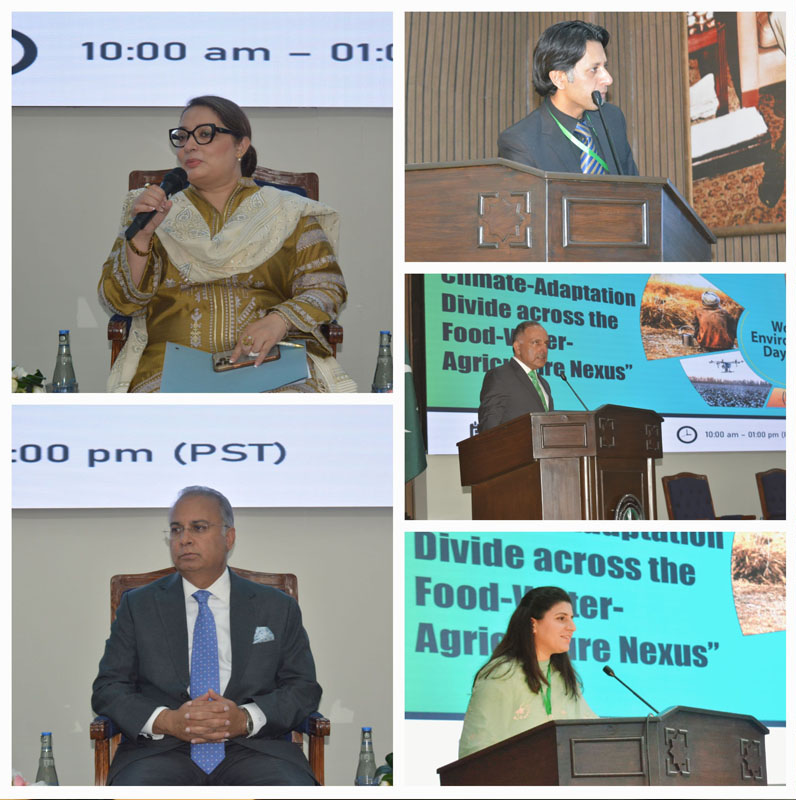
Honourable Justice Jawad Hassan, in an inspiring keynote address, underscored the judiciary’s constitutional role in advancing environmental rights and intergenerational equity. Citing landmark cases, Justice Jawad illustrated how Pakistan’s courts have progressively shaped climate justice through recognition of public trust doctrine and stakeholder coordination. Emphasizing the need for institutional reform, he called for integrated judicial education, legal curriculum reform, and technical capacity building. Stressing that compliance with climate treaties is a legal duty—not judicial activism—Justice Hassan advocated a multidimensional approach linking climate justice, finance, and business, while highlighting the judiciary’s vital role in ensuring equitable climate finance, fostering accountability, and enabling inclusive green development.
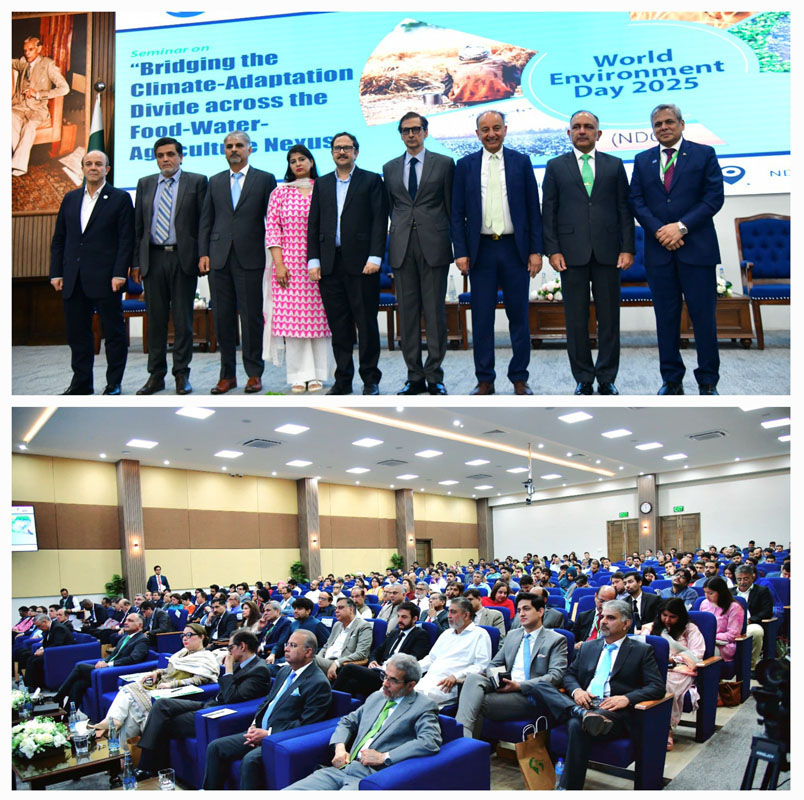
The thematic panel session featured thought leaders and climate experts, including H.E. Ms. Romina Khurshid Alam, Coordinator to the Prime Minister on Climate Change and Environmental Coordination; Lt. General Inam (HI-M), Chairman NDMA; Mr. Jahangir Piracha, Managing Director and CEO Fauji Fertilizer; Mr. Malik Amin Aslam Khan, former Federal Minister for Climate Change; Mr. Bilal Anwar, CEO NDRMF; and Dr. Muhammad Irfan khan, Dean Faculty opf baic and applied Sciences, International Islamic University Islamabad.
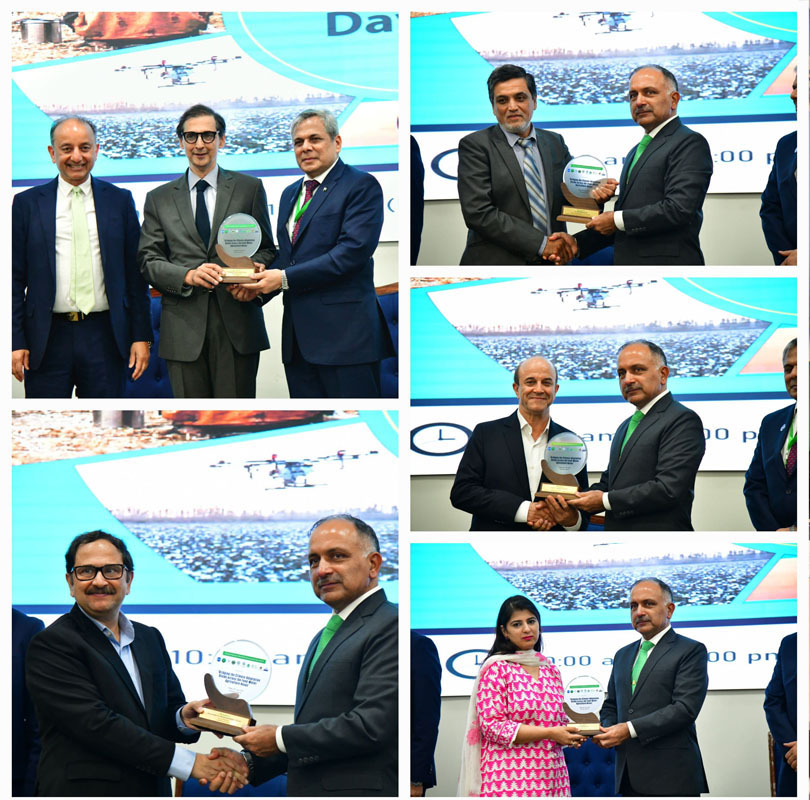
Panelists deliberated on a range of thematic issues including institutional fragmentation in climate and water governance; barriers to integrating climate-smart agriculture at the provincial level; the catalytic role of public–private partnerships in mobilizing climate finance; and the need for adaptive R&D to mainstream locally grounded innovations. Among the salient takeaways were the strategic importance of embedding digital climate advisories, farmer-led innovation ecosystems, and predictive modeling in rural development policy; the prioritization of gender-sensitive, nutrition-informed adaptation frameworks; and the recalibration of climate finance portfolios to support long-term, programmatic infrastructure and ecosystem resilience.
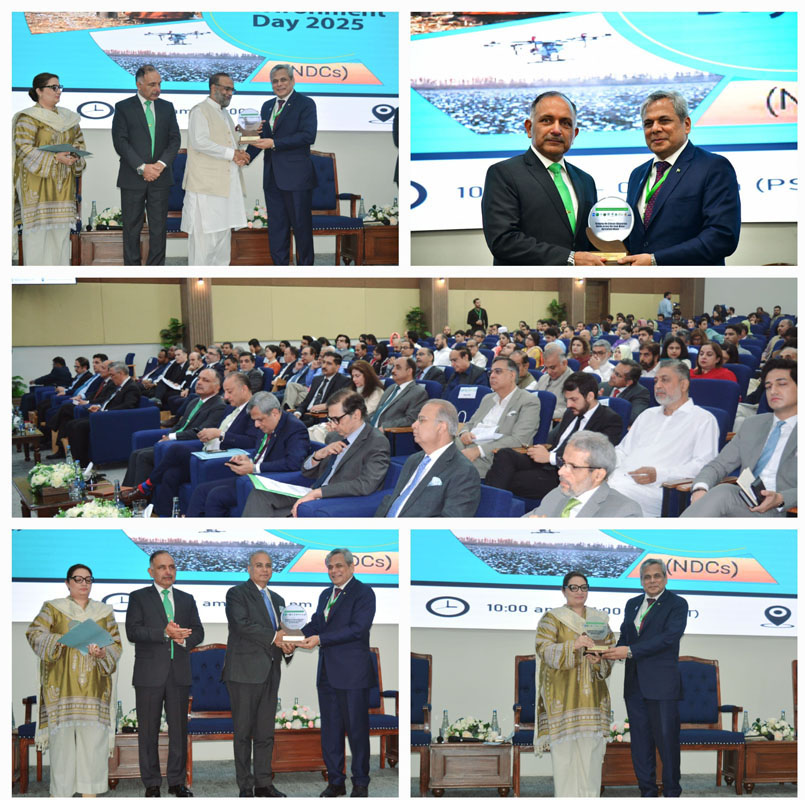
Heads of the Institutions that joined hands to organize the event, Executive Director COMSATS- Ambassador Dr. Zakaria; Chairman NDMA-Lt. General Inam Haider Malik (HI-M); President ECOSF-Prof. Dr. Seyed Komail Tayebi; CEO NDRMF-Mr. Bilal Anwar, CEO FACE-Mr. Hasan Akram; Country Rep ICARDA-Dr. Imtiaz Muhammad; and Country Director WHH-Ms. Aisha Jamshed; in their remarks underscored the imperative of science-driven diplomacy and South-South cooperation in navigating the climate crisis. Collectively, their statements delineated the contours of the adaptation divide and stressed the need for systemic, equity-driven responses to enhance climate resilience.

This high-level engagement reaffirmed the collective resolve of the participating institutions to advance multi-actor synergy, knowledge co-production, and strategic resource mobilization aimed at bridging the climate-adaptation divide in Pakistan and across the Global South.




